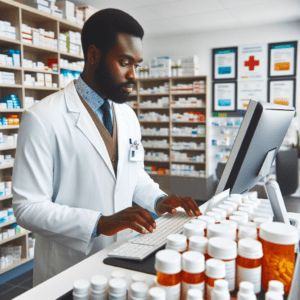Bachelor of Vocation (B.Voc) in Pharmaceutical Chemistry is a specialized undergraduate program designed to provide students with comprehensive training in the principles and practices of chemistry as they apply to the pharmaceutical industry. This program focuses on equipping students with the knowledge, skills, and practical experience necessary to work in various areas of pharmaceutical research, development, production, quality control, and regulatory affairs. Below is a detailed description of the program:
- Duration: The B.Voc program in Pharmaceutical Chemistry typically spans over three years, divided into semesters.
- Curriculum: The curriculum covers a wide range of subjects related to pharmaceutical chemistry, including organic chemistry, inorganic chemistry, physical chemistry, analytical chemistry, medicinal chemistry, pharmacology, pharmaceutics, and pharmaceutical analysis. Students learn about drug synthesis, formulation, characterization, evaluation, and regulatory aspects of pharmaceutical products.
- Practical Training: Emphasis is placed on hands-on laboratory training through practical sessions, experiments, projects, and internships in pharmaceutical research labs, production facilities, quality control labs, and regulatory agencies. Students gain practical experience in synthesis, purification, analysis, and characterization of pharmaceutical compounds under the guidance of experienced chemists and researchers.
- Industry Collaboration: The curriculum may include industry-oriented projects, guest lectures, seminars, and workshops conducted in collaboration with pharmaceutical companies, research institutes, and regulatory authorities to provide students with exposure to real-world pharmaceutical practices, technologies, and regulatory requirements.
- Regulatory Compliance: Students learn about Good Manufacturing Practices (GMP), Good Laboratory Practices (GLP), quality assurance, quality control, and regulatory compliance standards applicable to pharmaceutical manufacturing, testing, and distribution to ensure product safety, efficacy, and regulatory compliance.
- Core Subjects:
– Organic Chemistry
– Inorganic Chemistry
– Physical Chemistry
– Analytical Chemistry
– Pharmaceutical Chemistry
– Medicinal Chemistry
– Pharmacology
– Pharmaceutics
– Pharmaceutical Analysis - Specialization Electives (Sample):
– Drug Design and Synthesis
– Pharmaceutical Formulation Development
– Pharmacokinetics and Drug Delivery Systems
– Pharmaceutical Biotechnology
– Quality Control and Quality Assurance in Pharmaceuticals
– Regulatory Affairs in Pharmaceutical Industry
– Industrial Pharmacy
– Pharmaceutical Microbiology - Laboratory Techniques and Instrumentation:
– Organic Synthesis Techniques
– Chromatographic Techniques (HPLC, GC, TLC)
– Spectroscopic Techniques (UV-Vis, IR, NMR)
– Thermal Analysis Techniques (DSC, TGA)
– Mass Spectrometry (MS)
– Atomic Absorption Spectroscopy (AAS)
– Particle Size Analysis Techniques
– Dissolution Testing and Drug Release Studies - Practical Training Modules:
– Synthesis and Purification of Pharmaceuticals
– Formulation Development and Optimization
– Pharmaceutical Analysis and Quality Control
– Pharmacological Screening and Bioassays
– Stability Testing and Shelf-Life Determination
– Regulatory Documentation and Submission
– Research Projects in Pharmaceutical Chemistry
– Internship in Pharmaceutical Industry
- Chemistry Knowledge: In-depth understanding of chemical principles, reactions, mechanisms, and structure-activity relationships relevant to pharmaceutical compounds and drug discovery.
- Laboratory Techniques: Proficiency in conducting chemical synthesis, purification, analysis, and characterization using a variety of laboratory techniques, instruments, and equipment.
- Analytical Skills: Ability to analyze and interpret complex chemical data, spectra, chromatograms, and analytical results using advanced analytical techniques and instrumentation.
- Problem-Solving Abilities: Critical thinking skills to identify, troubleshoot, and resolve scientific and technical challenges encountered in pharmaceutical research, development, and production.
- Regulatory Knowledge: Familiarity with regulatory requirements, guidelines, and standards governing pharmaceutical manufacturing, testing, labeling, packaging, and distribution in domestic and international markets.
- Communication Skills: Effective communication and presentation skills to convey scientific concepts, experimental findings, and regulatory compliance issues to diverse audiences, including colleagues, supervisors, regulators, and stakeholders.
- Teamwork and Collaboration: Ability to work collaboratively in multidisciplinary teams, including chemists, biologists, pharmacologists, engineers, and regulatory affairs professionals, to achieve common goals in pharmaceutical research and development.
- Attention to Detail: Precision and accuracy in experimental design, data collection, documentation, and reporting to ensure reproducibility, reliability, and integrity of scientific findings and regulatory submissions.
- Research and Development Scientist: Conducting research to discover, develop, and optimize new pharmaceutical compounds, drug delivery systems, and formulation technologies in pharmaceutical companies, research institutes, or academic institutions.
- Process Chemist: Optimizing chemical processes for the synthesis, purification, and scale-up production of pharmaceutical compounds in manufacturing facilities, ensuring process efficiency, yield optimization, and compliance with regulatory standards.
- Analytical Chemist: Performing chemical analysis, method development, validation, and troubleshooting of pharmaceutical products, raw materials, and intermediates in quality control laboratories to ensure product quality, purity, and compliance with specifications.
- Regulatory Affairs Specialist: Managing regulatory submissions, documentation, compliance, and communication with regulatory authorities to obtain and maintain approvals for pharmaceutical products, ensuring compliance with applicable laws, regulations, and guidelines.
- Quality Assurance/Quality Control (QA/QC) Officer: Implementing and maintaining quality management systems, conducting quality audits, inspections, and investigations, and ensuring compliance with GMP, GLP, and regulatory requirements in pharmaceutical manufacturing and testing facilities.
- Formulation Scientist: Developing and optimizing formulations for pharmaceutical dosage forms, such as tablets, capsules, injections, and topical preparations, considering factors such as stability, bioavailability, patient compliance, and regulatory requirements.
- Pharmaceutical Sales and Marketing: Promoting pharmaceutical products, conducting market research, developing marketing strategies, and providing technical support to healthcare professionals and customers in pharmaceutical companies or marketing agencies.
B.Voc in Pharmaceutical Chemistry is a specialized program that prepares students for rewarding careers in the pharmaceutical industry. By providing a comprehensive curriculum, practical training, and industry exposure, the program equips graduates with the knowledge, skills, and professional competencies needed to contribute to pharmaceutical research, development, production, quality control, regulatory affairs, and marketing. With a focus on chemistry principles, laboratory techniques, regulatory compliance, and problem-solving skills, graduates are well-prepared to make significant contributions to drug discovery, development, and manufacturing processes, ensuring the safety, efficacy, and quality of pharmaceutical products for patient care and public health.
